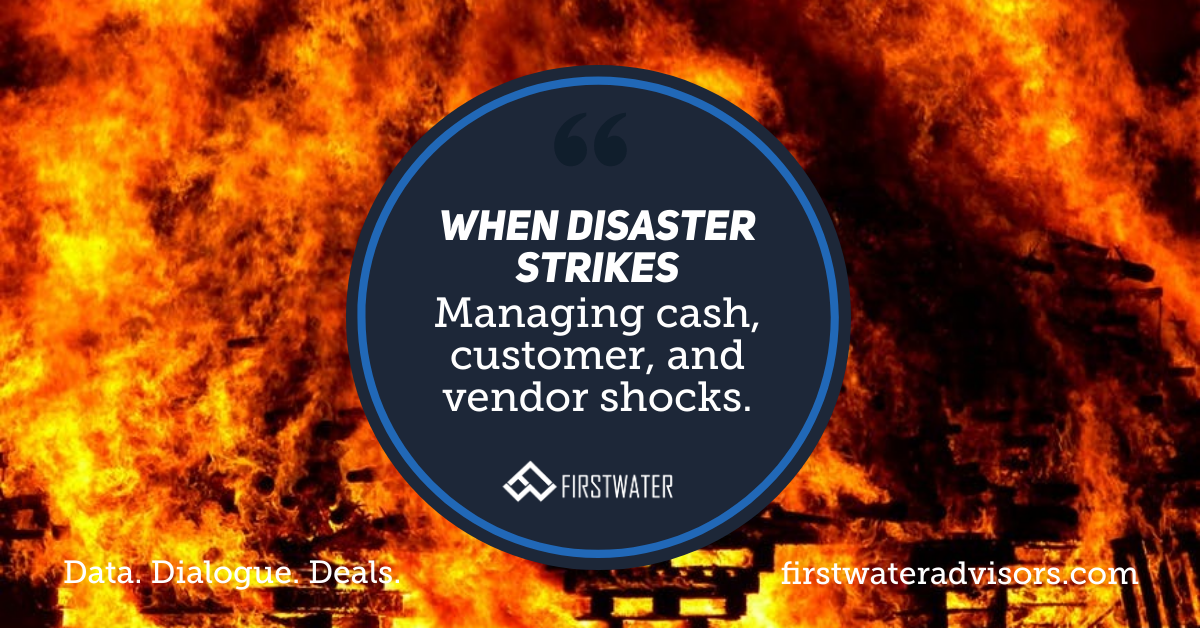Mike Tyson famously said, “Everybody has a plan until they get punched in the mouth.”
Nobody can perfectly plan for major business disruption, such as a natural disaster (or global pandemic). When it strikes, customers or vendors may disappear instantly, your workforce could be displaced, and there’s likely to be delays in others being able to open their doors. “Business as usual” sounds like a dream, yet scraping and clawing to get as close as possible is the only path. Bills still come due, people want (and need) to be paid, and your own family relies on the business for its well-being. Now’s the time to get tactical, and on the front lines is working capital (cash, inventory, receivables, payables).
Managing working capital comes down to three things: liquidity, cash forecast processes, and communication. In a crisis, liquidity evaporates faster than the rainwater. If you don’t already have the forecast processes in place, it’s difficult to establish them on the fly while you’re putting out fires (sometimes literally). Communication is one of your most important tools and can be your savior. Plus, it costs you nothing. Here are a couple tips for navigating the working capital gauntlet.
Transparency Remains the Best Policy
There’s a saying “it’s easier to ask for forgiveness than permission,” but you don’t need to be forgiven for a massive disaster outside of your control. Get on the phone with everybody as soon as you can, especially your biggest customers and vendors. Not only can you give them the download as to where you stand, but you can also get the same from them (Are they open? When will they start placing orders? Can they fill your orders?).
The more you communicate with these parties, the more flexibility will be mutually found. With your vendors, learn what’s in stock and what must be made/backordered. Usually you can get better terms (in price and payment timing) for things sitting on the shelf versus those that must be ordered (and thus sourced and paid for). For customers, ask if they can temporarily work with an alternate product, one of which you have a high inventory or that you can source readily/cheaply? You won’t know if you’re not talking!
Focus on the Best Relationships
Maybe you have big customers or vendors who aren’t affected by the disaster. While they might not be as sensitive to your situation as somebody down the street, they are arguably in the best position to help you. Even if the terms of the relationship are already great, now is the time to ask for more wiggle room. But beware, these are likely key relationships, and they’re doing you a favor. If you make promises (such as a payment schedule), do everything you can to keep your word even if it means prioritizing these relationships over others. Doubt leads to a quick hand on the spigot!
Be prepared for your customers and vendors to ask for concessions or additional information. They aren’t your bank, but whatever you’re asking for will increase their financial exposure to you. If they express concerns about your company’s viability, offer up no-cost options like weekly status updates or limited financial information (such as production volumes) so they can draw conclusions from data points other than only whether you pay on time. If customers want discounts (or vendors want premiums), try to push economic concessions to the future (“I need to get rack rate on this order, but I can give you 10% off the next two.”). Not only is this a good sales tactic to draw future orders, it helps the immediate term cash profile.
Cash is King. Protect the King!
When cash goes out the door, it’s gone. Even though this seems like one area where forgiveness is preferred to permission, you can still seek forgiveness after you’ve asked permission! You’re going to stretch everywhere you can, and when in doubt, hold it. Ask for deferrals wherever you can – you’ll be surprised how long-term lease providers / landlords are willing to work with you when their alternative is foreclosure or repo. Even at a significantly reduced rate, they’d much rather keep the space or equipment utilized in the wake of a local disaster.
Don’t take available liquidity for granted! Have room on your bank line? Draw it. If there’s a ‘material adverse change’ clause in your financing agreement, you may find yourself cut off after a disaster even if your business is healthy or the collateral backing the financing is good. As part of your customer conversations, early pay discounts may be worth the reduced margin to get the cash in the door. Monetize whatever you can quickly – the more cash you have on hand, the more options you’re going to have.


